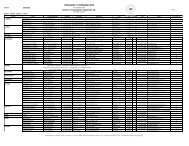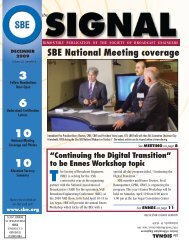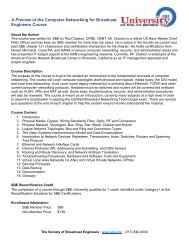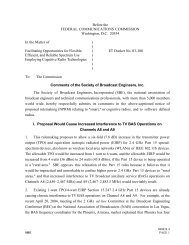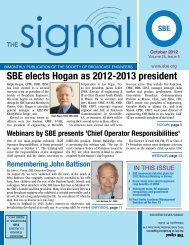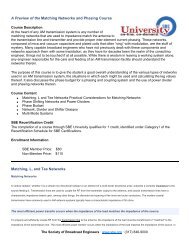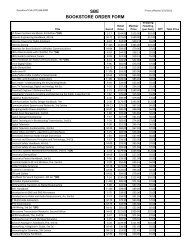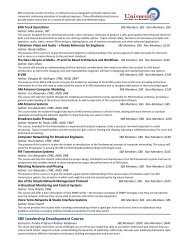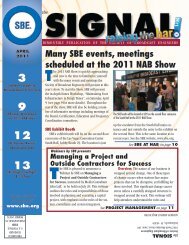Thomas re-elected SBE President - Society of Broadcast Engineers
Thomas re-elected SBE President - Society of Broadcast Engineers
Thomas re-elected SBE President - Society of Broadcast Engineers
Create successful ePaper yourself
Turn your PDF publications into a flip-book with our unique Google optimized e-Paper software.
The art <strong>of</strong> composing <strong>SBE</strong> Certification Exams<br />
BY Ter<strong>re</strong>nce M. Baun, CPBE, AMD, CBNT<br />
Administrator, Engineering and Operations, Wisconsin Educational Communications Board<br />
The illiterate <strong>of</strong> the 21st century will<br />
not be those who cannot <strong>re</strong>ad and<br />
write, but those who cannot learn,<br />
unlearn, and <strong>re</strong>learn.<br />
~Alvin T<strong>of</strong>fler<br />
clear and unambiguous question—and<br />
even mo<strong>re</strong> difficult to compose and<br />
structu<strong>re</strong> the possible <strong>re</strong>sponses in such<br />
a way as to p<strong>re</strong>sent only one challenging,<br />
but absolutely cor<strong>re</strong>ct, answer. And<br />
choice<br />
questions is<br />
not easy. It<br />
demands not<br />
only ca<strong>re</strong>ful<br />
hile the <strong>SBE</strong> Program <strong>of</strong> f<strong>re</strong>quently we find it far mo<strong>re</strong> difficult to selection <strong>of</strong><br />
Certification itself does compose the incor<strong>re</strong>ct answers that the topic and<br />
Ter<strong>re</strong>nce M. Baun<br />
not di<strong>re</strong>ctly teach, it does<br />
have the companion educational task<br />
<strong>of</strong> assessing the level <strong>of</strong> vocational<br />
accomplishment through c<strong>re</strong>ation and<br />
administration <strong>of</strong> testing. As part <strong>of</strong> that<br />
effort, <strong>SBE</strong> has the implicit duty to adjust<br />
the scope and content <strong>of</strong> its examinations<br />
to <strong>re</strong>flect cur<strong>re</strong>nt broadcast technology.<br />
If Certification examinations fail to <strong>re</strong>flect<br />
industry principles and practices it not<br />
only dilutes the value <strong>of</strong> certification for<br />
all who participate, but also th<strong>re</strong>atens the<br />
c<strong>re</strong>dibility <strong>of</strong> the Certification effort as a<br />
whole.<br />
It is not surprising then, that one<br />
<strong>of</strong> the most important duties <strong>of</strong> the<br />
Certification Committee <strong>re</strong>qui<strong>re</strong>s <strong>re</strong>gular<br />
examination <strong>of</strong> the <strong>re</strong>levance <strong>of</strong> every<br />
certification question, ascertaining<br />
whether some need to be <strong>re</strong>written<br />
to improve their clarity, and c<strong>re</strong>ating<br />
new ones as our industry evolves. If<br />
you’ve ever been curious about just how<br />
questions get into the Certification exams,<br />
you may find the following points <strong>of</strong><br />
inte<strong>re</strong>st.<br />
1. Every question on every<br />
Certification Exam is autho<strong>re</strong>d by a<br />
member <strong>of</strong> the Certification Committee<br />
and <strong>re</strong>viewed by that Committee befo<strong>re</strong><br />
it is incorporated into the question<br />
pool, so each question is based upon<br />
the personal industry experience <strong>of</strong> one<br />
or mo<strong>re</strong> <strong>of</strong> our Committee Members.<br />
This committee authorship is one if<br />
the primary ways we insu<strong>re</strong> that the<br />
questions a<strong>re</strong> <strong>re</strong>levant to broadcast<br />
technology. But selecting the subject <strong>of</strong> a<br />
question is only the first step!<br />
It is surprisingly difficult to frame a<br />
8<br />
cor<strong>re</strong>ct ones! Educators have written<br />
many books on the art <strong>of</strong> constructing<br />
fair but effective multiple choice exams,<br />
and he<strong>re</strong> a<strong>re</strong> some <strong>of</strong> the rules we try to<br />
follow:<br />
• We frame the question (what<br />
educators call “Writing the Stem”) so<br />
as to clearly pose a problem or state<br />
a question. The test-taker should be<br />
able to understand the question without<br />
<strong>re</strong>ading it several times and without<br />
having to <strong>re</strong>ad any <strong>of</strong> the possible<br />
answers;<br />
• We write the cor<strong>re</strong>ct answer<br />
(“Writing the Response”) in such a way<br />
as to be unquestionably the only cor<strong>re</strong>ct<br />
answer;<br />
• We base the other possible answer<br />
choices (“Composing the Distractors”)<br />
on logical fallacies or common errors<br />
<strong>re</strong>lated to the stem question, so as<br />
to further challenge the test-takers<br />
understanding <strong>of</strong> the stem question;<br />
• We minimize use <strong>of</strong> “all <strong>of</strong> the<br />
above” or “both A&B” as distractors,<br />
since they make it possible to guess<br />
the cor<strong>re</strong>ct answer with only partial<br />
knowledge;<br />
• We use “none <strong>of</strong> the above”<br />
inf<strong>re</strong>quently, as it is only appropriate<br />
for situations in which the<strong>re</strong> a<strong>re</strong> only<br />
absolutely cor<strong>re</strong>ct answers, such as<br />
mathematics problems;<br />
• We examine the enti<strong>re</strong> selection <strong>of</strong><br />
questions in each Certification Exam to<br />
p<strong>re</strong>vent inadvertently providing answers<br />
to p<strong>re</strong>vious or subsequent questions<br />
through question wording or choice <strong>of</strong><br />
distractors.<br />
Writing effective and fair multiple<br />
achievement level, but also development<br />
<strong>of</strong> a clearly defined answer accompanied<br />
by plausible distractors.<br />
2. Every question in the test pool is<br />
periodically <strong>re</strong>viewed by the Certification<br />
Committee members. We ask:<br />
• Is this question still <strong>re</strong>levant to the<br />
industry? A majority “No” <strong>re</strong>sponse from<br />
the panel will <strong>re</strong>move such questions<br />
from the question pool immediately;<br />
• Is this question framed accurately<br />
and is the cor<strong>re</strong>ct answer the<br />
unambiguous cor<strong>re</strong>ct choice? Often<br />
someone on the Committee will bring a<br />
f<strong>re</strong>sh viewpoint to the question, <strong>re</strong>sulting<br />
in <strong>re</strong>vision <strong>of</strong> one or mo<strong>re</strong> <strong>of</strong> the<br />
“distractors” or changes in the language<br />
used for the cor<strong>re</strong>ct answer;<br />
• What is the level <strong>of</strong> technical<br />
competency <strong>re</strong>flected by this question?<br />
Is a question suitable for mo<strong>re</strong> than one<br />
Certification level? Should its level be<br />
adjusted upward or downward because<br />
<strong>of</strong> changes in the industry? Can this<br />
question be used for mo<strong>re</strong> than one<br />
Certification a<strong>re</strong>a?<br />
3. When a question is missed<br />
consistently by a significant number <strong>of</strong><br />
test-takers, or is the subject <strong>of</strong> specific<br />
comment by an individual test-taker, that<br />
question is brought to the Committee to<br />
consider the following:<br />
• Is the question clear and<br />
unambiguous? A<strong>re</strong> the distractors<br />
appropriate?<br />
• Is the<strong>re</strong> a cultural bias or false<br />
assumption in the question that has gone<br />
undetected?<br />
See CERT on page 20<br />
the SIGNAL



